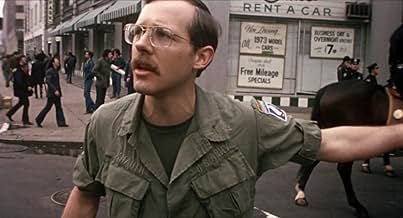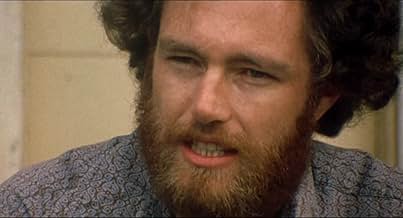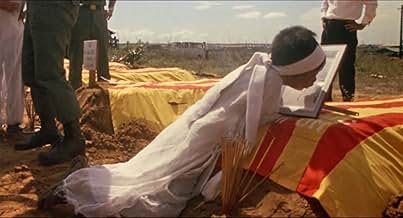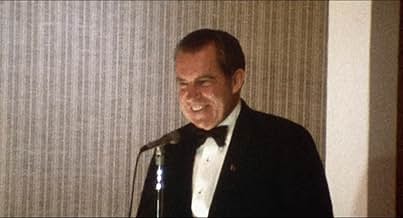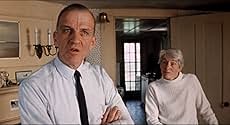AVALIAÇÃO DA IMDb
8,2/10
6,5 mil
SUA AVALIAÇÃO
Um exame das atitudes conflitantes dos oponentes da Guerra do Vietnã.Um exame das atitudes conflitantes dos oponentes da Guerra do Vietnã.Um exame das atitudes conflitantes dos oponentes da Guerra do Vietnã.
- Ganhou 1 Oscar
- 5 vitórias e 1 indicação no total
Ngo Dinh Diem
- Self - President of South Vietnam
- (cenas de arquivo)
John Foster Dulles
- Self - Secretary of State, 1953-1959
- (cenas de arquivo)
Kay Dvorshock
- Self
- (cenas de arquivo)
Dwight D. Eisenhower
- Self - President of the United States
- (cenas de arquivo)
Lyndon B. Johnson
- Self
- (cenas de arquivo)
- (as Lyndon Johnson)
John F. Kennedy
- Self - President of the United States
- (cenas de arquivo)
Robert F. Kennedy
- Self - U.S. Senator
- (cenas de arquivo)
William Marshall
- Self
- (as Sgt. WIlliam Marshall - Detroit)
Eugene McCarthy
- Self - U.S. Senator
- (cenas de arquivo)
Ho Chí Minh
- Self
- (cenas de arquivo)
Avaliações em destaque
Davis does a neat job of laying out the absurdity in the US's involvement in Vietnam. He does it mainly through the use of two techniques.
(1) Successive contrast, as it's called in the psychology of perception. If you stare at a black square for a while, then switch your gaze to a gray square, it looks white, not gray. In this movie Davis juxtaposes moments from interviews and newsreel footage to demonstrate how far removed high-level speeches can be from events as they take place on the ground. General Westmoreland, who, like General Douglas MacArthur, was another one of those giants in the field of Oriental psychology, explains to us that Asians don't place the same kind of value on human life as Westerners do. (He might have been thinking of kamikaze attacks from WWII.) Cut to a Vietnamese funeral full of wailing mourners. A coach gives a pep talk, screaming and weeping, to a high school football team in Niles, Ohio. "Don't let them BEAT US!" he cries. Cut to a scene of combat.
(2) Selective interviewing and editing. The Vietnamese seem to speak nothing but common sense and they are seen doing nothing but defending themselves -- and very little of that. The Americans that we see and hear are mostly divided into two types: phony idiots and wised-up ex-patriot veterans. Fred Coker is an exception. He's a naval aviator who was evidently a POW. He's clean-cut, intelligent, and articulate, and he's given a lot of screen time. This is all for the good because he's about the only pro-war character we see. He's been there and he still believes. He serves as a useful bridge between the pro-war idiots and the embittered anti-war Americans.
And of course the statements we hear on screen are selected for their dramatic value. One former pilot describes how he and his comrades approached their bombing missions -- for some of them it was just a job, part of the daily grind, but for some others it got to be kind of fun. And for him? "I enjoyed it." The amazing thing in propagandistic documentaries like this is not that the sound bites were selected. Of course they were, otherwise you'd have a dull movie of a thousand people from the middle of the road. "Dog bites man" is not news. "Man bites dog" IS news! No, the truly astonishing thing is that some of the interviewees actually SAID these things in the first place. Selective or not, here is the evidence on film. And how is it possible to "take out of context" General Westmoreland's disquisition on the Oriental attitude towards life? Or a vet smirking and saying he enjoyed killing Gooks?
I'm reminded of a scene in Michael Moore's first documentary, "Roger and Me." Moore is talking to a handful of rich wives who are on some Flint, Michigan, golf course, chipping balls. His camera rolls on and on while the ladies chat about the closing of the plants and the movement of jobs to cheaper labor markets. They love the area around Flint -- great golf courses, good riding country. And the newly unemployed? Well, says one of the wives, before a swing, now they'll have to get up and find a job. Poor people are always lazy anyway.
It's a shocking statement, and we hear similarly shocking statements throughout this movie. It all leaves a viewer with a sense of awe that anyone could be so unashamedly deluded.
I don't see any reason to point out the similarities between what happened in Viet Nam and what's going on as I write this. I wish our current leaders, practically none of whom served in the military let alone Viet Nam, could have seen this because it might have served as a useful reminder that war isn't REALLY very much like a high school football game.
G. K. Chesterton once wrote, "My country, right or wrong, is a thing no true patriot would think of saying. It is like saying, 'My mother, drunk or sober'".
(1) Successive contrast, as it's called in the psychology of perception. If you stare at a black square for a while, then switch your gaze to a gray square, it looks white, not gray. In this movie Davis juxtaposes moments from interviews and newsreel footage to demonstrate how far removed high-level speeches can be from events as they take place on the ground. General Westmoreland, who, like General Douglas MacArthur, was another one of those giants in the field of Oriental psychology, explains to us that Asians don't place the same kind of value on human life as Westerners do. (He might have been thinking of kamikaze attacks from WWII.) Cut to a Vietnamese funeral full of wailing mourners. A coach gives a pep talk, screaming and weeping, to a high school football team in Niles, Ohio. "Don't let them BEAT US!" he cries. Cut to a scene of combat.
(2) Selective interviewing and editing. The Vietnamese seem to speak nothing but common sense and they are seen doing nothing but defending themselves -- and very little of that. The Americans that we see and hear are mostly divided into two types: phony idiots and wised-up ex-patriot veterans. Fred Coker is an exception. He's a naval aviator who was evidently a POW. He's clean-cut, intelligent, and articulate, and he's given a lot of screen time. This is all for the good because he's about the only pro-war character we see. He's been there and he still believes. He serves as a useful bridge between the pro-war idiots and the embittered anti-war Americans.
And of course the statements we hear on screen are selected for their dramatic value. One former pilot describes how he and his comrades approached their bombing missions -- for some of them it was just a job, part of the daily grind, but for some others it got to be kind of fun. And for him? "I enjoyed it." The amazing thing in propagandistic documentaries like this is not that the sound bites were selected. Of course they were, otherwise you'd have a dull movie of a thousand people from the middle of the road. "Dog bites man" is not news. "Man bites dog" IS news! No, the truly astonishing thing is that some of the interviewees actually SAID these things in the first place. Selective or not, here is the evidence on film. And how is it possible to "take out of context" General Westmoreland's disquisition on the Oriental attitude towards life? Or a vet smirking and saying he enjoyed killing Gooks?
I'm reminded of a scene in Michael Moore's first documentary, "Roger and Me." Moore is talking to a handful of rich wives who are on some Flint, Michigan, golf course, chipping balls. His camera rolls on and on while the ladies chat about the closing of the plants and the movement of jobs to cheaper labor markets. They love the area around Flint -- great golf courses, good riding country. And the newly unemployed? Well, says one of the wives, before a swing, now they'll have to get up and find a job. Poor people are always lazy anyway.
It's a shocking statement, and we hear similarly shocking statements throughout this movie. It all leaves a viewer with a sense of awe that anyone could be so unashamedly deluded.
I don't see any reason to point out the similarities between what happened in Viet Nam and what's going on as I write this. I wish our current leaders, practically none of whom served in the military let alone Viet Nam, could have seen this because it might have served as a useful reminder that war isn't REALLY very much like a high school football game.
G. K. Chesterton once wrote, "My country, right or wrong, is a thing no true patriot would think of saying. It is like saying, 'My mother, drunk or sober'".
There are certain subjects so horrendous and so important that fictionalizing them, regardless of the good intentions of the film maker, can only trivialize them. "Schindler's List", "JFK" and "The Deer Hunter" come to mind.
Give me a good documentary any time, and this is one of the best.
It takes the silly rhetoric of our leaders and juxtaposes it with images showing the horrendous results of their short-sighted policies.
If you want to know what the VietNam war was really all about, (and why so many of us were against it,) skip "Apocalypse Now", "Go Tell the Spartans" and "Full Metal Jacket" and watch this one.
Give me a good documentary any time, and this is one of the best.
It takes the silly rhetoric of our leaders and juxtaposes it with images showing the horrendous results of their short-sighted policies.
If you want to know what the VietNam war was really all about, (and why so many of us were against it,) skip "Apocalypse Now", "Go Tell the Spartans" and "Full Metal Jacket" and watch this one.
10greg-253
Peter Davis created one of the most moving accounts of the Vietnam War and the attitudes at home when he produced "Hearts and Minds".
The film looks unflinchingly at the nature of power and horrible consequences of war. It is very much a pro-peace film, but uses the people who were there to speak for themselves. It also seeks to probe deeper underneath the American psyche of the times and evolves into a historical document about the violent social rupture that happened between the fifties and the sixties.
In many ways, it feels like a punch in the gut to watch the film. So many ideologies are laid bear....so many were false or misleading.
In the end, the film leaves you thinking about the price of war - and who is given the task to bear that price.
Truly deserving of the Oscar it received - and worthy of repeated viewing.
The film looks unflinchingly at the nature of power and horrible consequences of war. It is very much a pro-peace film, but uses the people who were there to speak for themselves. It also seeks to probe deeper underneath the American psyche of the times and evolves into a historical document about the violent social rupture that happened between the fifties and the sixties.
In many ways, it feels like a punch in the gut to watch the film. So many ideologies are laid bear....so many were false or misleading.
In the end, the film leaves you thinking about the price of war - and who is given the task to bear that price.
Truly deserving of the Oscar it received - and worthy of repeated viewing.
I have never been so shocked and outraged before today when I watched "Hearts and minds". We are shown stunning images of the people of Vietnam suffering from a child crying for his father, from a wife tying to get into the grave with her husband, to two sisters pained by the death of their elder sister. We were shown images of brutality from the enemies of these poor people who had absolutely nothing to show for. Their houses were set on fire, we are even shown images of the Americans kicking a man in his privates and then being smashed in the head by their weapon. It was totally shocking! Americans sleeping with prostitutes and the image that will live with me forever, was that of an American soldier shooting a young man in the head with blood gushing out and yet the camera is still rolling. Don't these people feel any shame? You get American soldiers saying they enjoyed killing those people but after watching images years later of the pain and suffering, they felt regret. It's changed my perspective forever. Something that should not have happened in the first place.
A documentary of the conflicting attitudes of the opponents of the Vietnam war.
Roger Ebert wrote, "Here is a documentary about Vietnam that doesn't really level with us... If we know something about how footage is obtained and how editing can make points, it sometimes looks like propaganda... And yet, in scene after scene, the raw material itself is so devastating that it brushes the tricks aside." Exactly right. The folks who made this are clearly anti-war, but some of the footage they get is unforgettable.
Most notably is the interview with General William Westmoreland where he says, "The Oriental doesn't put the same high price on life as does a Westerner. Life is plentiful. Life is cheap in the Orient." How can that be interpreted any other way?
The movie was chosen as Academy Award for Best Documentary Feature at the 47th Academy Awards presented in 1975. This win was not only well-deserved, but opened the door for possibly an even better Vietnam documentary: Errol Morris' "The Fog of War: Eleven Lessons from the Life of Robert S. McNamara" (2003), which also won the Oscar.
Roger Ebert wrote, "Here is a documentary about Vietnam that doesn't really level with us... If we know something about how footage is obtained and how editing can make points, it sometimes looks like propaganda... And yet, in scene after scene, the raw material itself is so devastating that it brushes the tricks aside." Exactly right. The folks who made this are clearly anti-war, but some of the footage they get is unforgettable.
Most notably is the interview with General William Westmoreland where he says, "The Oriental doesn't put the same high price on life as does a Westerner. Life is plentiful. Life is cheap in the Orient." How can that be interpreted any other way?
The movie was chosen as Academy Award for Best Documentary Feature at the 47th Academy Awards presented in 1975. This win was not only well-deserved, but opened the door for possibly an even better Vietnam documentary: Errol Morris' "The Fog of War: Eleven Lessons from the Life of Robert S. McNamara" (2003), which also won the Oscar.
Você sabia?
- CuriosidadesDuring his Oscar acceptance speech, producer Bert Schneider read a letter from the head of the Viet Cong lauding his film. Bob Hope prompted Oscar host Frank Sinatra to disclaim any political statements that had been made during the show.
- Citações
Daniel Ellsberg: The question used to be: might it be possible that we were on the wrong side in the Vietnamese War? But, we weren't on the wrong side. We are the wrong side.
- Cenas durante ou pós-créditosThe listed translators credited in the movie (Le Thai To, Trung Trac, Le Thanh Tong and Trung Hung Dao) were all Vietnamese generals who had defeated the Chinese in various times from the first century C.E., to the fifteenth century C.E. The translator listed as Nguyen Ai Quoc was an early alias of Ho Chi Minh, founder of the Vietnamese Communist Party. I have no knowledge of the last listed translator, Barbara Gore. Apparently, someone played a good joke on the producers of this film, if it wasn't the translators themselves.
- ConexõesFeatured in Sneak Previews: Take 2: Vietnam Movies (1980)
Principais escolhas
Faça login para avaliar e ver a lista de recomendações personalizadas
- How long is Hearts and Minds?Fornecido pela Alexa
Detalhes
- Data de lançamento
- País de origem
- Centrais de atendimento oficiais
- Idiomas
- Também conhecido como
- Hearts and Minds
- Locações de filme
- Empresas de produção
- Consulte mais créditos da empresa na IMDbPro
Bilheteria
- Faturamento bruto nos EUA e Canadá
- US$ 28.754
- Fim de semana de estreia nos EUA e Canadá
- US$ 8.556
- 24 de out. de 2004
- Faturamento bruto mundial
- US$ 28.754
Contribua para esta página
Sugerir uma alteração ou adicionar conteúdo ausente

Principal brecha
By what name was Corações e Mentes (1974) officially released in India in English?
Responda

